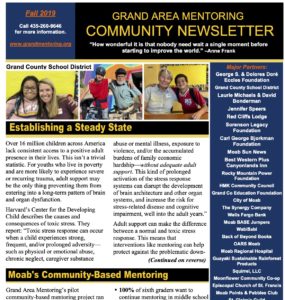Fall 2019 Community Newsletter
Establishing a Steady State
Over 16 million children across America lack consistent access to a positive adult presence in their lives. This isn’t a trivial statistic. For youths who live in poverty and are more likely to experience severe or recurring trauma, adult support may be the only thing preventing them from entering into a long-term pattern of brain and organ dysfunction.
Harvard’s Center for the Developing Child describes the causes and consequences of toxic stress. They report: “Toxic stress response can occur when a child experiences strong, frequent, and/or prolonged adversity—such as physical or emotional abuse, chronic neglect, caregiver substance abuse or mental illness, exposure to violence, and/or the accumulated burdens of family economic hardship—without adequate adult support. This kind of prolonged activation of the stress response systems can disrupt the development of brain architecture and other organ systems, and increase the risk for stress-related disease and cognitive impairment, well into the adult years.”
Adult support can make the difference between a normal and toxic stress response. This means that interventions like mentoring can help protect against the problematic down-stream results of childhood trauma. The Center for the Developing child writes, “research shows that, even under stressful conditions, supportive, responsive relationships with caring adults as early in life as possible can prevent or reverse the damaging effects of toxic stress response.”
Not every youth participant at Grand Area Mentoring has experienced toxic stress. However, some have. This is why Grand Area Mentoring strives to bring responsible, caring adults together with at-risk youth. Mentoring relationships in Moab typically begin in early elementary school, between grades one and four. These one-on-one matches last for years, providing dependable support to combat a host of adverse factors.
Harvard explains: “stable, loving relationships can buffer against harmful effects by restoring stress response systems to ‘steady state.’” A regulated nervous system, with reduced levels of the stress hormone cortisol, can empower bodies and minds to grow normally and even regain lost ground, well into adulthood.
To ensure that positive relationships thrive, Grand Area Mentoring carefully screens, trains, and supports volunteer mentors in Moab over time. They have many opportunities for advanced training throughout the year, and all are asked to attend Kelly Vagts’ three-part Trauma-Informed Mentoring series.
For more on the ACEs research and how our society can respond, visit:

[button url=”https://grandmentoring.org/wp-content/uploads/Community-Newsletter-Fall-2019.pdf” target=”_blank” style=”red” size=”medium” type=”square”]View Newsletter [/button]
